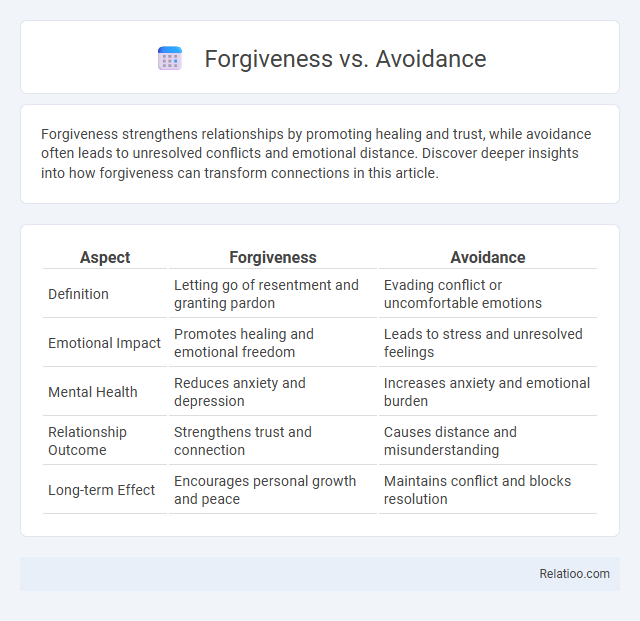Forgiveness strengthens relationships by promoting healing and trust, while avoidance often leads to unresolved conflicts and emotional distance. Discover deeper insights into how forgiveness can transform connections in this article.
Table of Comparison
| Aspect | Forgiveness | Avoidance |
|---|---|---|
| Definition | Letting go of resentment and granting pardon | Evading conflict or uncomfortable emotions |
| Emotional Impact | Promotes healing and emotional freedom | Leads to stress and unresolved feelings |
| Mental Health | Reduces anxiety and depression | Increases anxiety and emotional burden |
| Relationship Outcome | Strengthens trust and connection | Causes distance and misunderstanding |
| Long-term Effect | Encourages personal growth and peace | Maintains conflict and blocks resolution |
Understanding Forgiveness: Definition and Importance
Understanding forgiveness involves recognizing it as a conscious, deliberate decision to release feelings of resentment or vengeance towards someone who has caused harm. Forgiveness promotes emotional healing, reduces stress, and enhances mental well-being, distinguishing it from avoidance, which involves steering clear of conflicts, and denial, which entails refusing to acknowledge painful realities. Embracing forgiveness fosters healthier relationships and inner peace by addressing grievances constructively rather than suppressing or ignoring them.
What Is Avoidance? Psychological Roots Explained
Avoidance is a psychological defense mechanism where individuals deliberately steer clear of confronting distressing thoughts, emotions, or situations to reduce anxiety or discomfort. Rooted in the fight-or-flight response, avoidance stems from the brain's attempt to protect itself from perceived threats by evading pain or conflict rather than addressing the underlying issues. Unlike forgiveness, which involves processing and releasing negative emotions, and denial, which rejects reality outright, avoidance delays emotional healing by maintaining silence or distance from problems.
Emotional Effects: Forgiveness vs Avoidance
Forgiveness promotes emotional healing by reducing feelings of anger, resentment, and stress, fostering inner peace and psychological well-being. Avoidance temporarily suppresses emotional pain but often leads to increased anxiety, unresolved conflicts, and prolonged emotional distress. Choosing forgiveness over avoidance supports healthier emotional regulation and improves interpersonal relationships.
The Role of Forgiveness in Mental Health
Forgiveness plays a pivotal role in mental health by reducing stress, anxiety, and depressive symptoms through emotional release and cognitive reframing. Unlike avoidance, which postpones dealing with emotional pain, and denial, which blocks reality, forgiveness enables individuals to confront and resolve inner conflicts constructively. Research consistently links forgiveness to improved psychological well-being, enhanced resilience, and stronger interpersonal relationships.
Avoidance and Its Impact on Relationships
Avoidance in relationships often leads to unresolved conflicts, fostering resentment and emotional distance between partners. Your unwillingness to address issues directly can erode trust and communication, resulting in a weakened bond. Prioritizing open dialogue over avoidance promotes healthier connections by allowing mutual understanding and emotional growth.
Conflict Resolution: Choosing Forgiveness Over Avoidance
Forgiveness fosters genuine conflict resolution by encouraging emotional healing and open communication, essential for restoring trust and mutual understanding. Avoidance delays addressing core issues, often exacerbating resentment and prolonging conflicts, while denial undermines reality by refusing to acknowledge problematic behaviors or feelings. Prioritizing forgiveness enables constructive dialogue and long-term reconciliation, promoting healthier relationships and sustainable peace.
Barriers to Forgiveness and How to Overcome Them
Barriers to forgiveness often include avoidance and denial, which impede emotional processing by suppressing or ignoring painful experiences, leading to unresolved resentment and prolonged distress. Overcoming these barriers involves mindful acknowledgment of the hurt, confronting emotions honestly, and fostering empathy toward oneself and others to facilitate genuine healing. Therapeutic approaches such as cognitive-behavioral therapy and guided forgiveness exercises can effectively dismantle avoidance and denial, promoting emotional release and reconciliation.
The Long-Term Consequences of Avoidance
Avoidance in dealing with emotional pain often leads to unresolved issues that fester over time, increasing stress and anxiety levels in the long term. This coping mechanism blocks Your ability to process emotions effectively, resulting in chronic psychological distress and potential relationship breakdowns. Addressing underlying feelings through forgiveness or acceptance promotes healing, whereas continued avoidance prolongs suffering and impedes emotional growth.
Practical Steps to Cultivate Forgiveness
Cultivating forgiveness involves conscious efforts such as acknowledging the hurt, expressing emotions constructively, and choosing empathy toward the offender. Practicing mindfulness and journaling can aid in processing feelings, while setting healthy boundaries prevents avoidance and denial from hindering emotional healing. Engaging in forgiveness rituals or seeking therapy supports sustained personal growth and reconciliation.
Forgiveness vs Avoidance: Which Path Leads to Healing?
Forgiveness fosters emotional healing by allowing you to release resentment and rebuild trust, promoting inner peace and stronger relationships. Avoidance, however, often prolongs pain by suppressing feelings and preventing resolution, which can lead to increased stress and emotional distance. Choosing forgiveness over avoidance paves the way for genuine healing and personal growth.

Infographic: Forgiveness vs Avoidance
 relatioo.com
relatioo.com